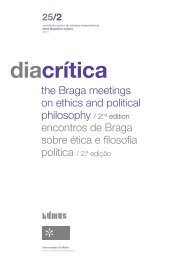Revista (PDF) - Universidade do Minho
Revista (PDF) - Universidade do Minho
Revista (PDF) - Universidade do Minho
You also want an ePaper? Increase the reach of your titles
YUMPU automatically turns print PDFs into web optimized ePapers that Google loves.
224<br />
DIACRÍTICA<br />
of their joint stake of $160,000 into a small house and use the rest of<br />
the money to reduce their work commitments out of the home and<br />
share child-rearing responsibilities. Suppose they can’t <strong>do</strong> this on<br />
$8,800 a year. Why stop them?<br />
More broadly: basic income encourages a short-term consumerist<br />
perspective, but stakeholding invites young adults to take the longer<br />
view. Most people in their twenties are crushed by the vast gap between<br />
adult responsibilities and small financial resources. Although their<br />
future is still ahead of them, they live lives of quiet desperation –<br />
trying to make ends meet from month to month. Although $400 a<br />
month will ease short-term financial crises, it is too small a sum to give<br />
them real free<strong>do</strong>m to look decades ahead and appreciate the life-shaping<br />
choices they are making, often by default. Stakeholding, by contrast,<br />
invites them to take charge of their lives. With $80,000 in the<br />
bank, young adults may pause and consider how their aims and abilities<br />
are likely to unfold over time, and whether a short-term perspective<br />
will lead them <strong>do</strong>wn paths that they will later bitterly regret.<br />
Basic income will also turn out to be a bureaucratic nightmare.<br />
Suppose that John Citizen is grimly determined to become an auto<br />
mechanic. Since legitimate banks won’t let him capitalize his monthly<br />
payments into $20,000, he goes to a friendly member of the neighborhood<br />
Mafia and borrows the money, promising to use his $4,800<br />
a year as collateral. Since this deal is illegal, the mafiaso won’t be able<br />
to go to court to enforce it – but he will hire thugs, at his own expense,<br />
if John refuses to pay when the time comes. All this expense and<br />
uncertainty will greatly increase the interest that the mafioso will<br />
charge his customer. But John is willing to pay the price to begin<br />
executing his life plan.<br />
How <strong>do</strong>es the proponent of basic income to respond to this development?<br />
Do we really want to transform John into a criminal – simply<br />
because he wants to make an investment in his future? What kind of<br />
crime is that?<br />
Whatever the law may say, it is virtually certain that it won’t be<br />
enforced by draconian sanctions. The black-market option not only<br />
lets the mafia appropriate the lion’s share of John’s economic<br />
birthright, but it will also reorient his relationship to the entire program.<br />
Under stakeholding, John could proudly come forward and<br />
claim his stake as a free citizen; now the state’s efforts to restrain his<br />
free<strong>do</strong>m has turned him into a devious thief. When John finally<br />
becomes a skilled mechanic, he will not remember the stakeholding<br />
experience with pride, and seek to reciprocate by acts of loyal citizen-











![Programa [pdf] - cehum - Universidade do Minho](https://img.yumpu.com/17305425/1/190x135/programa-pdf-cehum-universidade-do-minho.jpg?quality=85)




